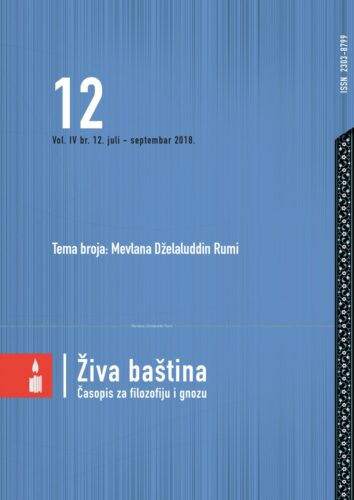UDK 141.336
Sažetak
Rumijeva duša je mnoge zemaljske godine prosanjarila dok je lagano prelazila iz egzistencijalne postelje jednoga kraljevstva u drugu, iz svijeta mineralnog, biljnog i životinjskog do kraljevstva govoreće duše (nafs nātiqa), koja umije razborito da pripovijeda i smisleno da se izražava. Ona tako najzad postaje misleća duša u zenitu vlastitog ontološkog islama, na mikrokozmičkoj razmeđi neotriježnjenih svjetova, koji se steru podno ljudskog srca, ili podno govoreće / misleće duše, i onih gornjih svjetova “halife Božijeg na Zemlji”, svjetova uma kao “interpretativnog vjerovjesnika” u nama, svjetova duhovnog srca kao “prijestolja Božijeg” u nama i svjetova stvaralačke imaginacije kao “nebeske zemlje” suštih božanskih simbola u nama. Ali, tek nakon susreta sa Šemsom iz Tabriza, tim nesvakidašnjim glasonošom “religije Ljubavi”, rumijevka, govoreća / misleća / sjećajuća duša uspravila se u vlastitom unutarnjem svijetu, u samoj zavičajnosti skrivenoj iza ademovske ljušture, i vrlinom vlastitog pamćenja onog najboljeg iz svog dotadašnjeg hodočašća kroz svjetove podno vlastita srca najzad se počela prisjećati gornjih svjetova – tih interpretativnih ljestvi kojima se spremala vratiti svojoj nebeskoj domaji, ka kojoj svaka duša živa teži.
Nakon sustavno provedene hermeneutike nad vlastitom gramatikom vjere, Rumijeva duša dovedena je na same duhovne zbilje simboličkog jezika Riječi Božije, a rečene zbilje nisu drugo doli oni egzistencijalni toposi iz kojih kvrcaju božanska mudrost, ljubav, ljepota, dobrota, plemenitost, nježnost, naklonost, darežljivost… Odande dolazi i Rumijev jezik. Najneposrednije narastajući na simboličkom jeziku Riječi Božije, Rumijev jezik je takav da pulsira po ritmu Bitka Božijeg i preklapa se sa svim razinama univerzalnog postojanja (al-kawn al-jāmi‘), koje razlijeva Bitak Božiji u svome teofanijskom silaženju i gradiranju od svijeta Tajanstva do svijeta vidljivih oblika.
Kao što su riječi makrokozmosa proistekle iz Riječi Božije, tako su riječi mikrokozmosa proistekle iz ljudske duše kao čisti otisak Božijeg atributa Govora. Riječ Božija tvori svjetove, a ljudske riječi te svjetove tumače. Rumijev filozofsko-teološko-sufijski i poetski opus najbolja su potvrda tome. U njemu su smirene riječi njegove duše koje pogađaju sama srca stvari i pojava u univerzalnom postojanju, što je za Rumija bilo od iznimne važnosti. Jer, ako ljudske riječi ne prosežu u srca stvari i pojava, onda su one netačne i neiskrene; ako su netačne i neiskrene, one jednostavno ljudskoj duši ne prenose znanje o stvarnoj prirodi stvari i pojava u nama i oko nas. One onda nisu dobre riječi, koje bi trebale mirisati aromom božanske dobrote, i stoga nijedna od njih ne vrijedi koliko hiljadu riječi, a trebala bi, jer stoga je Bog obdario ljudsku dušu naslovom “govoreće duše” (al-nafs al-nātiqa) i ukrasio je temeljnom odlikom vlastitog atributa Govora.
The language of Rumi’s soul
Rešid Hafizović
Abstract
Rumi’s soul has dreamt away many earthly years while it slowly passed from the existential bed of one kingdom to another, from the world of minerals, plants and animals to the kingdom of the talking soul (nafs nātiqa) which is able to narrate reasonably and express itself meaningfully. In that way, it finally becomes a thinking soul in the zenith of its own ontological Islam, on the micro cosmological crossroad of unsobered worlds spread at the base of human heart or at the base of talking/thinking soul, and those higher worlds of ‘God’s khalif on the Earth’, the worlds of the intellect as a ‘interpretative prophet’ within ourselves, the worlds of the spiritual heart as a ‘throne of God’ within ourselves and the worlds of the creative imagination as a ‘heavenly earth’ of the pure divine symbols within ourselves. However, only after his encounter with Shams from Tabriz, that unusual messenger of ‘the religion of Love’, rumi’s, talking/thinking/remembering soul straightened up in its own inner world, in its very homelandn hidden behind Adamic shell, and, by the virtue of its own remembering of that which is best of its hitherto pilgrimage through the worlds at the base of its own heart, finally it started to remember the higher worlds – the interpretative ladder by which it was preparing to go back to its heavenly homeland to which every living soul strives.
Having systematically conducted hermeneutics over its own grammar of faith, Rumi’s soul has been brought to the very spiritual realities of the symbolic language of the Word of God, while the mentioned realities are nothing but those existential toposes from which divine wisdom, love, beauty, goodness, nobleness, gentleness, affection, generosity… stem. It is where Rumi’s language comes from as well. The most directly growing on the symbolic language of the Word of God, Rumi’s language is such that it pulses according to the rhythm of the Being of God and overlaps with all the levels of the universal existence (al-kawn al-jāmi’) which the Being of God pours in its theophanic descent and gradation from the world of Secrecy to the world of visible forms.
Just like the words of macrocosm arose from the Word of God, so the words of microcosm arose from human soul like a pure print of God’s attribute of Speech. The Word of God creates worlds, and the words of humans interpret these worlds. Rumi’s philosophic-theological-Sufi and poetic opus is the best confirmation of that. Within him, there are calm words of his soul that affect the very hearts of things and phenomena in the universal existence, which was of extraordinary significance for Rumi. Since, if the words of humans do not permeate into the hearts of things and phenomena, then they are wrong and insincere; if they are wrong and insincere, they simply do not convey to soul the knowledge about the real nature of things and phenomena within us and around us. Then they are not good words, words that should have the smell of the aroma of the divine goodness, and, for that reason, none of them is worth thousand words, and it should, because that is why God has bestowed upon human soul the title ‘talking soul’ (al-nafs al-nātiqa) and has adorned it with the basic characteristic of His own attribute of Speech.
Keywords: talking soul, symbolic language, the religion of Love, Rumi’s literary-poetic narrative.
[tags]

